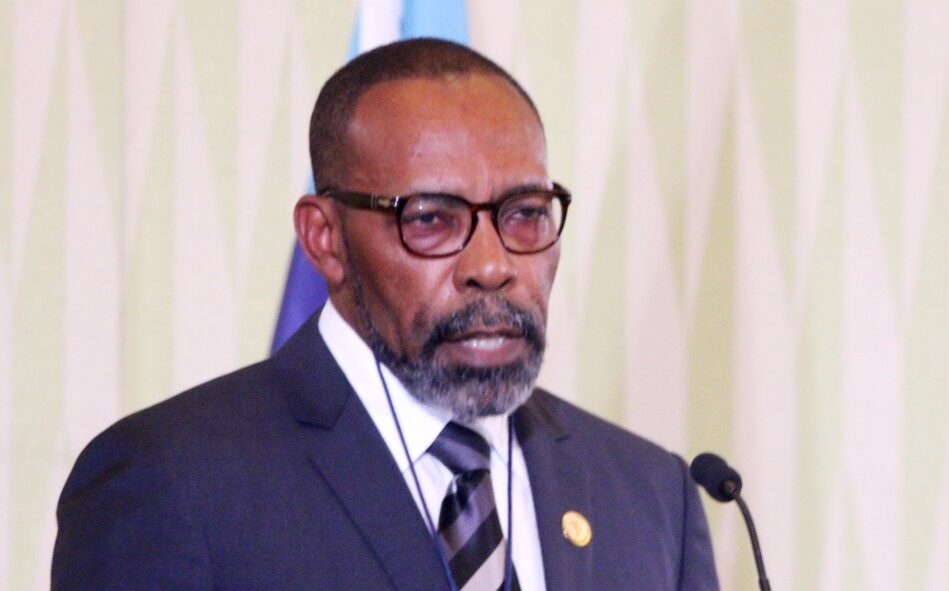Chairman of Caribbean Court of Justice Calls for Reform of Lengthy Remand Periods in Criminal Justice System

October 19, 2023
The Chairman of the Caribbean Court of Justice calls for criminal justice system reform, emphasizing the need for swift justice and coordination among entities to address the region's crime problems.
By Jenique Belgrave
Chairman of the Caribbean Court of Justice (CCJ) Academy for Law, Justice Winston Anderson has deemed the length of time people are held on remand awaiting trial “unacceptable”.
“Persons accused of a crime are sometimes deprived of their freedom for five, 10, 15 or more years, by euphemistically being referred to as being on remand. These and other features of our criminal justice system are not acceptable. They must be reformed,” he declared at Wednesday’s opening ceremony of the 7th Biennial Law Conference of the Caribbean Court of Justice Academy for Law at the Hilton Barbados.
“There must be swift justice for the guilty so that there is a correlation between crime and punishment in the public perception. The innocent must not have their liberty and productive years sacrificed on the altar of inefficiency and disinterest,” Justice Anderson added.
Contending that an “alarming pandemic of crime and criminality has engulfed much of the Caribbean”, the judge, who is the conference co-chair, stressed that it was time for “real justice” which could be achieved if the system became more efficient.
“There must be swift justice for the guilty so that there is a correlation between crime and punishment in the public perception. The innocent must not have their liberty and productive years sacrificed on the altar of inefficiency and disinterest. It is time for all victims of criminal justice to have real justice,” he stressed.
In seeking to achieve this effectiveness, President of the CCJ Justice Adrian Saunders said there must be proper coordination between all entities that make up the system.
“There are police and prisons, prosecutors; we have lawyers, we have judges, courts, legislatures, executive bodies, probation and welfare departments, just to name a few. Each has their own role, their own priorities, their own jurisdiction, but there must be at least a basic level of coordination and of understanding the policy premise among all these various players if the system as a whole is to function in an effective manner,” he insisted.
Delivering brief remarks, Attorney General Dale Marshall noted that any solutions to addressing the justice system in the region must take into account the challenges experienced by small island states, especially with regard to resources.
“Our states have some peculiar problems. When we make a decision to hire more judges, there’s a good chance that it means fewer nurses for the Queen Elizabeth Hospital. My constituency is in the east of the island. St Joseph has the worst roads in Barbados, but I have to tell the prime minister I will abide with bad roads for another year or two because we want to divert those funds toward the criminal justice system. The point is that we all have a very small pot, and we have to decide how to use the ingredients in that pot with a minimum of friction and waste,” he said.
The AG also highlighted the country’s aim to reduce the number of persons turning to a criminal way of life.
“Our most innovative approach has nothing to do with the criminal justice system, but in finding creative ways of making sure that fewer people enter that pipeline,” he said.
“We’ve been thinking about enhancing the DPP’s [Director of Public Prosecution’s] office – increasing the size of the judiciary, doing a whole host of things – but we’ve now sat down and we’ve said what we really need to do is to stop people from becoming criminals, and if we put a significant part of our resources into diverting people from entering that particular pipeline, then we really are beginning to address the criminal justice problem, but in a different way.”
The three-day conference which has as its theme, Criminal Justice Reform in the Caribbean: Achieving a Modern Criminal Justice System, is being held with the support of the United Nations Development Programme’s PACE Justice project and is co-funded by the European Union.
[email protected]


